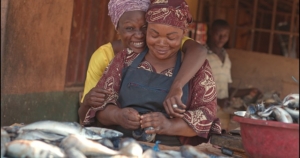Poverty Reduction in Nigeria
 The West African country Nigeria has the fastest-growing population in sub-Saharan Africa. However, the Nigerian population is outpacing poverty reduction as the population grows and the economy declines. Essentially, the demand for jobs is much higher than the availability.
The West African country Nigeria has the fastest-growing population in sub-Saharan Africa. However, the Nigerian population is outpacing poverty reduction as the population grows and the economy declines. Essentially, the demand for jobs is much higher than the availability.
Therefore, the World Bank has projected that the number of Nigerians living below the national poverty line will increase by 13 million people by 2025.
Income Inequality in Nigeria
There are several reasons for the high poverty rates in Nigeria, one of which is income inequality. The average income in rural versus urban Nigeria is incredibly unbalanced. In the past, agriculture was a key export in Nigeria. However, this industry is no longer financially flourishing, leaving those in the rural farmlands susceptible to low income.
Nigeria struggles with various factors that contribute to food insecurity. The most dominant is poverty, along with climate-related challenges that amplify the effects and hardships of poverty, such as drought and flooding. As a result, millions of Nigerians in rural marginalized areas experience extreme malnutrition and chronic hunger.
Currently, 80% of exports from Nigeria are oil, which only represents 1% of national jobs. This contributes to the shocking statistic that four out of 10 Nigerians live in poverty.
The Nigerian government is working to implement reforms that can promote poverty reduction and aid civilians to have a better quality of life. One such reform is the elimination of fuel subsidies.
The Aftermath of Eradicating Fuel Subsidies
Despite the thriving fuel industry, subsidies on petroleum have caused problems in Nigeria for decades.
Nigeria first implemented its fuel subsidies policy in 1977. The Nigerian government enacted these restrictions to provide a cushion from the 1973 oil crisis. However, what was initially intended for six months has remained for twenty-four years. As a result, the policy did not ease the burden of fuel prices but rather bankrupted the government. Fuel subsidies are 15% of the federal budget, more than education and health combined.
In 2012, the Nigerian government announced its plan to eradicate fuel subsidies, causing an uproar and protests over the new policy. In June 2023, President Bola Tinubu told the nation that “the fuel subsidy is gone.” Fearing the inevitable spike in gasoline costs, hundreds of people fled to petrol stations with jerry cans to prepare for the future.
The transition period appears to have poorly affected the public. For example, the petroleum market price increased by 200%. However, the perpetuation of subsidies appeared to be unattainable. Its elimination could pave the way for other initiatives that aim to alleviate poverty. This includes a budget increase for public services, health, transport and education.
Although widely unpopular among citizens, terminating the subsidies could promote a unified exchange rate, reduce corruption and allocate a larger budget for investing in long-term sustainable reformations.
External Support in the Fight to End Poverty in Nigeria
Non-governmental organizations (NGOs) like Food Clique support communities in Nigeria that are most affected by poverty. Food Clique promotes poverty reduction for affected people through donations that fund nutritious food and free school meals. Alongside fighting hunger, these programs also encourage attendance and productivity, promote physical strength and build disease resistance.
Food Clique provides sustainable solutions to food insecurity, alleviating poverty in Nigeria. It also bridges the gap of poverty by helping communities gain access to nutritious meals and promoting long-term solutions. This work is critical because Food Clique aims to build a more food-secure nation and thus reduce the effects of poverty.
The British Red Cross estimates that as of 2022, 19.5 million people in Nigeria do not have enough to eat. However, with the tireless efforts of Food Clique and other nonprofit organizations, there is hope for progress.
Looking Ahead
In summary, poverty reduction in Nigeria has been a slow and complex process, and only now have major reforms beginning to take effect within the government. The removal of fuel subsidies and subsequent inflation impacted the poorest Nigerians the most. In the long run, however, these reforms could create new jobs and allow the government to fund other sectors, such as education and health, to reduce the impact of poverty in Nigeria.
– April Plenderleith
Photo: Pixabay
